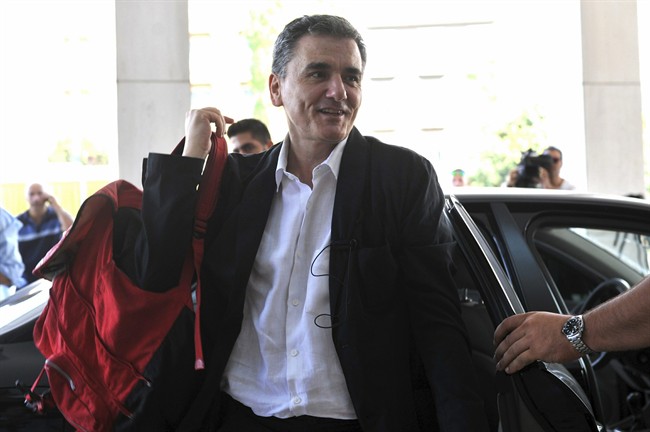ATHENS, Greece – Greece only has a few details to iron out with international creditors before concluding a bailout agreement, officials said Tuesday, raising hopes that the cash-strapped country could be ready to finalize a deal within the day.

Greek Finance Minister Euclid Tsakalotos sounded upbeat about the prospects of an imminent deal that would prevent the country’s default later this month and secure its future in the euro.
“I think we are very close. Two or three very small details remain,” he said as he emerged Tuesday morning from all-night talks with negotiators representing Greece’s creditors at a central Athens hotel.
He did not elaborate further on the outstanding details.
Similarly optimistic remarks came from government aide Theodoros Mihopoulos, who said on Twitter that the negotiation had been completed and that “some details remain.”
Greece’s government is hoping to push the new 85 billion-euro ($93 billion) three-year agreement through parliament this week, ahead of an expected meeting between eurozone finance ministers on Friday.

Get daily National news
A key test will be the reaction of Greece’s creditor countries. Germany, the largest single contributor to Greece’s two previous bailouts, has stressed the importance of being thorough in the complicated negotiations.
Greece needs a deal by Aug. 20 at the latest, when it has a debt repayment of a little more than 3 billion euros to make to the European Central Bank. The country won’t be able to make that payment without funds emerging from the country’s third bailout in just over five years.
However, many in the governing left-wing Syriza party are voicing their opposition to the deal, which would see the imposition of further spending cuts among a series of austerity measures.
Syriza lawmaker and dissenter Costas Lapavitsas reiterated his opposition and said he would not vote in favour of the new deal in Parliament.
“Left-wing governments must take left-wing actions,” he said on private Mega television.
Greece has relied on international bailouts worth a total 240 billion euros ($263 billion) since it lost market confidence and was unable to borrow from anyone else in 2010. To secure funds from the bailouts, successive governments have had to implement a series of spending cuts, tax hikes and reforms.
While the austerity has reduced budget overspending, the measures compounded a deep recession and fuelled record high unemployment. Figures next week are set to confirm that Greece’s recession deepened in the second quarter as concerns over the country’s euro future dented confidence.
Though the radical left-led government was elected on a staunchly anti-austerity platform in January, it has been forced into a policy U-turn after bailout talks came close to collapse last month.
While Greece’s parliament ratified further tax hikes and reforms, the rebellion by hardline Syriza lawmakers has left Prime Minister Alexis Tsipras’ party with only a nominal parliamentary majority. It depends on opposition backing to pass key creditor-demanded legislation.
That has stoked talk that Tsipras will call early elections soon after the bailout deal is signed. Tsipras still retains strong personal support in opinion polls, which show Syriza heading for a potentially big victory.





Comments